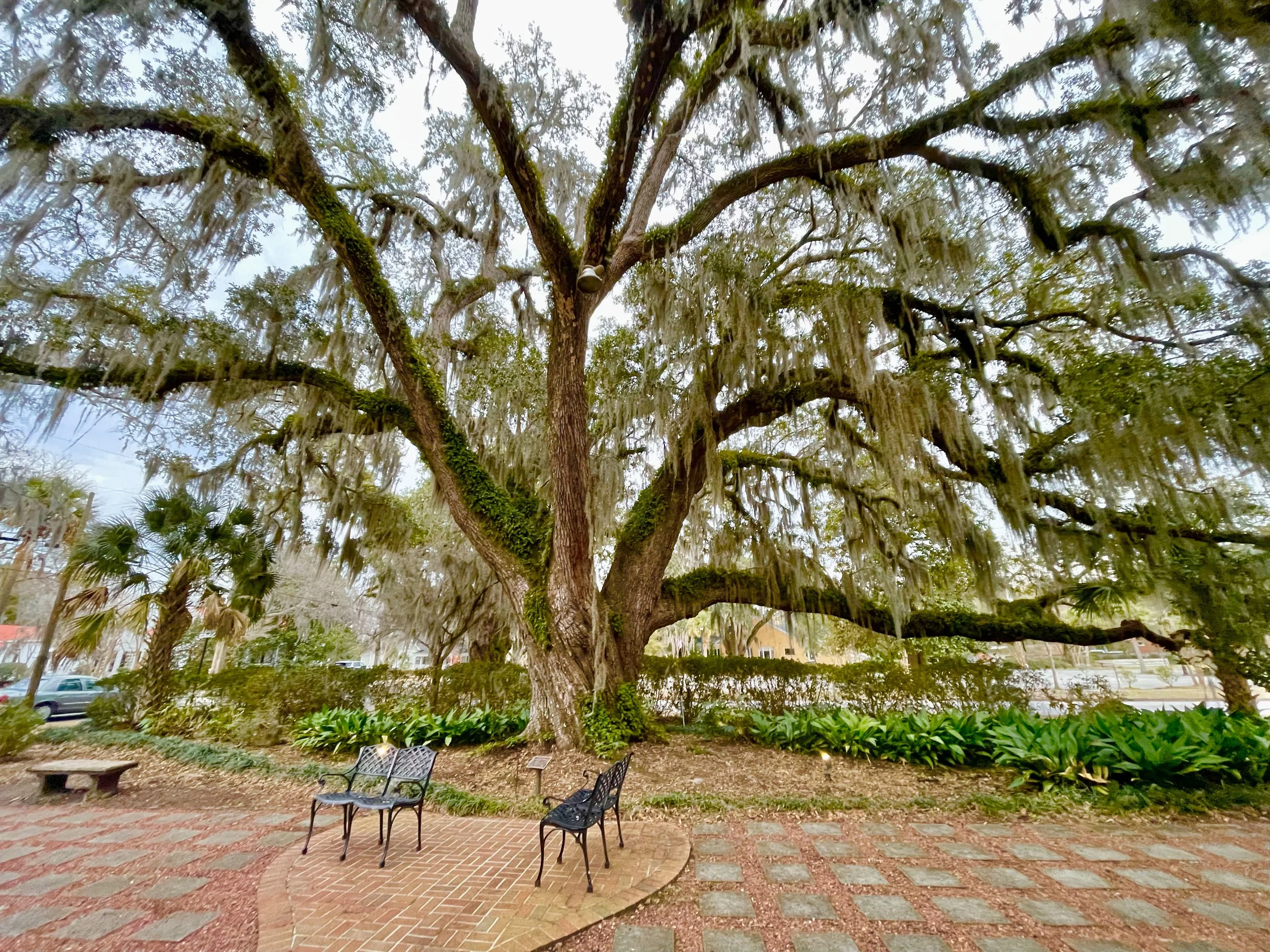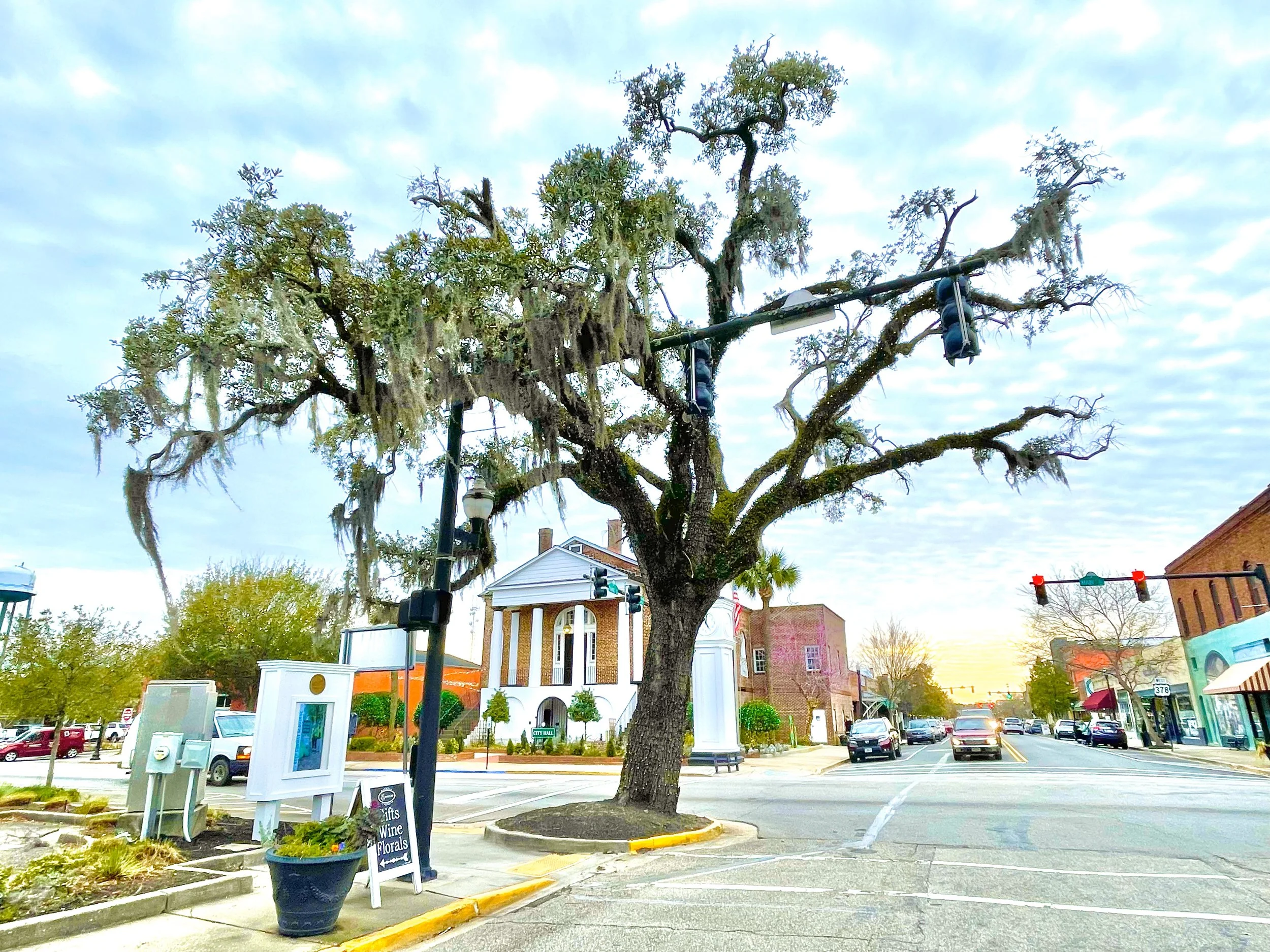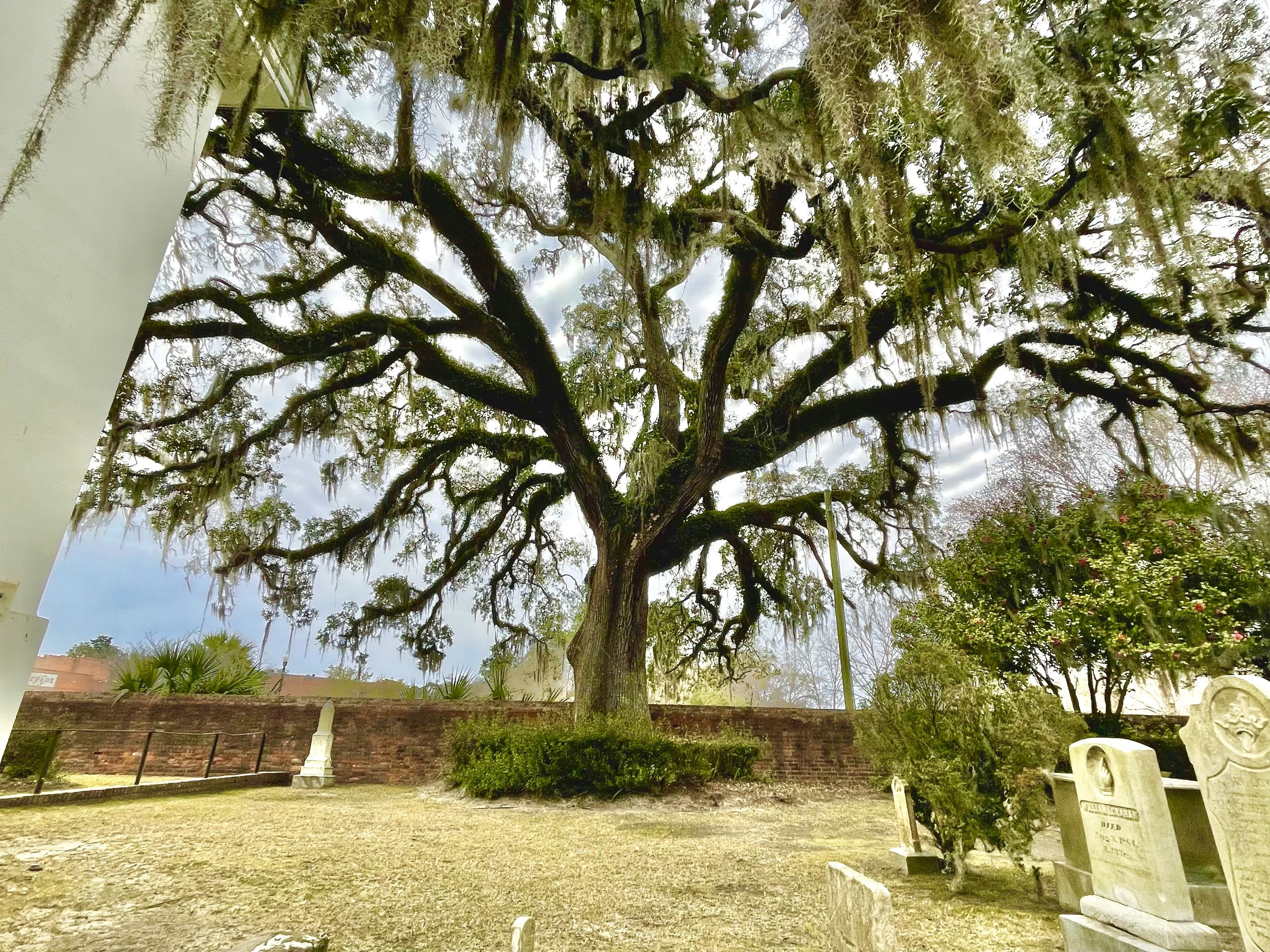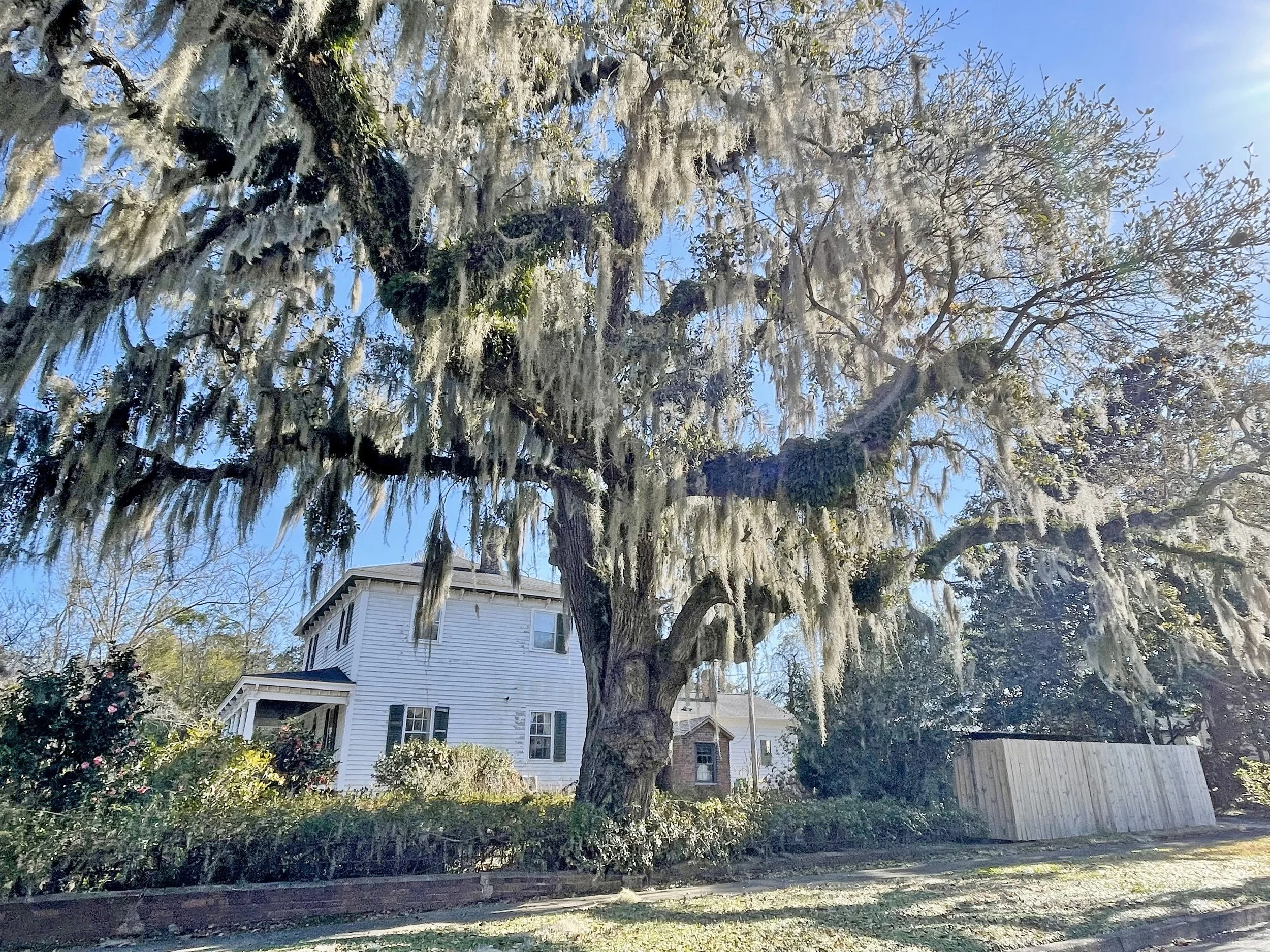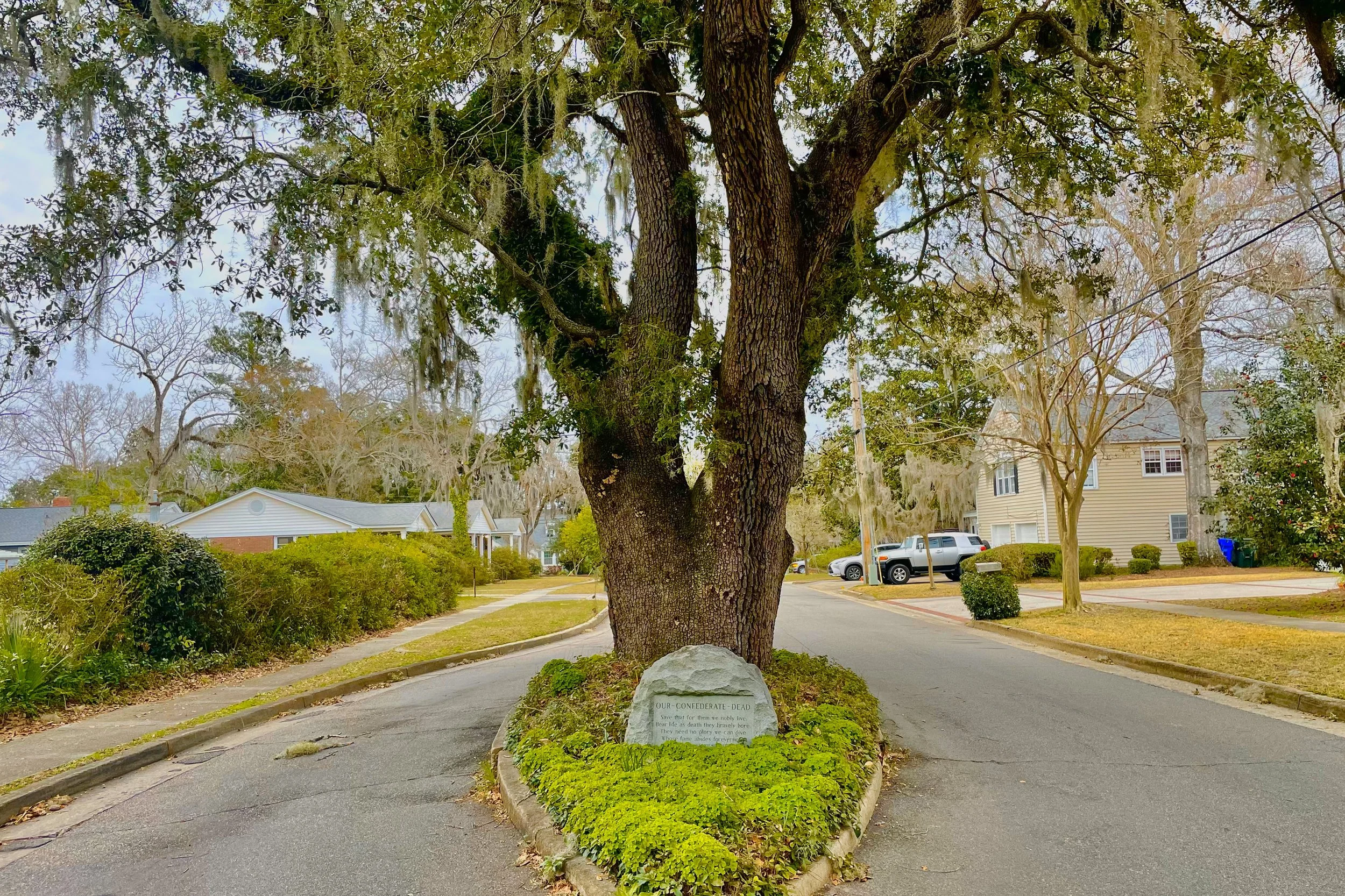CONWAY OAKS TOUR
The Town Hall Oak
Start Here: The Town Hall Oak (also known as the Hanging Oak) is across the street from Conway City Hall. While many have referenced public executions at this location, there is no evidence that this was the case. In the late 1800s, a room was used at the jail across the street for executions.
Qwaygo Insider Tips: Conway’s Main Street is a very busy road. Please use caution when navigating this tour, and always use pedestrian crosswalks.
Graveyard Oaks
Stop 2: Several impressive oaks overlook the aging graveyard at Kingston Presbyterian Church. Visitors are allowed to walk around the church and view the grounds. Please do not touch the brittle graves. The Graveyard Oaks name is a Qwaygo-designated name and not an official name.
Qwaygo Insider Tips: The newly expanded Conway River Walk is just behind this church. It is a beautiful scenic walkway overlooking the Waccamaw River.
The T.W. Beaty Home “The Oaks”
Stop 3: This once was the home of Thomas W. Beaty and his wife, Mary. The yard once expanded out to Main Street. The following two oak trees on the tour belong to what was once the front yard of this home.
Qwaygo Insider Tips: Thomas W. Beaty was a Confederate Lieutenant in the Civil War.
Wade Hampton Oak
Stop 4: This oak dates back to 1605 and is named after S.C. Governor Wade Hampton III. Governor Wade Hampton III visited the area in 1876 during his political campaign. This oak was part of a grove of trees in the expansive front yard of the house you saw at stop 3. It is said that when workmen prepared to lay track for the first railroad to enter Conway, Mary Beaty, wife of Thomas Beaty, stood armed with a shotgun and threatened dire consequences to anyone who cut the tree down.
Qwaygo Insider Tips: The tree’s circumference is 16’2”, and it is over 420 years old.
Mary Beaty Oak
Stop 5: The Mary Beaty Oak dates back to 1768 and stands on the same block as the Wade Hampton Oak. It is also surrounded by a brick planter. This oak is named after Mary Elizabeth Brookman Beaty (1824 - 1901), who defended the Wade Hampton Oak with a loaded shotgun when railroad workers threatened to cut it down.
Qwaygo Insider Tips: The tree’s circumference is 9’4”, and it is over 250 years old.
Alligator Oak
Stop 6: The Alligator Oak stands in the First United Methodist Church graveyard across the street from the Mary Beaty Oak. Walk around until you see the iconic downward-facing alligator face. The large knot is the eye, and the snout is going down towards the ground.
Qwaygo Insider Tips: The tree's circumference is nearly 19 feet, and it is around 500 years old (Circa 1537).
503 Main Street Oaks
Stop 7: From the Alligator Oak, continue up Main Street to 6th Avenue. The 503 Main Street Oaks are beautifully covered in Spanish Moss. On the limbs of oaks grows Resurrection Ferns. The ferns get their name because they will shrivel up brown until it rains, and then they open into vibrant green leaves.
Qwaygo Insider Tips: This is a private residence. Please stay on the sidewalk.
Buffalo Head Oak
Stop 8: This is another private residence with a beautiful oak easily viewable from the sidewalk. If you look at the tree's lower trunk, you will see a large knot resembling a buffalo head. The Buffalo Head Oak name is a Qwaygo-designated name, not an official one. Do you see the buffalo head? Please continue to the next stop, the Confederate Oak, which sits in the middle of 6th Avenue.
Qwaygo Insider Tips: This is a private residence. Please stay on the sidewalk.
Confederate Oak
Stop 9: When you reach this Oak, you’ll find a granite marker that bears four lines of poetry entitled Our Confederate Dead, composed by Archibald Rutledge. The marker faces the location of the town’s “Musterfield,” where the local militia would gather to drill and prepare for military service.
Qwaygo Insider Tips: This oak is over 17 feet around and dates back to 1596 (Over 425 years old).
Evelyn Snider Oak
Stop 10: From the Confederate Oak, you’ll see a church where the over 500-year-old Evelyn Snider Oak grows. Explore the grounds of this church, as several magnificent oaks grow here.
Qwaygo Insider Tips: The Evelyn Snider Oak is signified by a marker. It is over 22 feet around.
The Kraken Oak
Stop 11: Similar to the Alligator Oak, the Kraken oak looks as though it has a face. However, this face resembles a giant squid or sea monster. The Kraken Oak name is a Qwaygo-designated name, not an official one.
Qwaygo Insider Tips: From certain angles, the tree knot resembles an eye, and its face resembles twisted tentacles.
The Bad Day Oak
Stop 12: The Bad Day Oak is appropriately named after the tell-tale signs of run-ins with motor vehicles. The oaks of Conway have endured hundreds of years of industrialization. They have witnessed the days when Native Americans ruled the land. They have survived through the days of horse and carriage, the railroad, and the age of motor vehicles. Who knows what else these trees will survive to “see”? The Bad Day Oak is a testament to Conway’s preservation of these old trees. The roads were bent, curved, and split to save the oaks that lie in the way of development. The Bad Day Oak name is a Qwaygo-designated name, not an official one.
Qwaygo Insider Tips: You are headed back to downtown Conway. Visit the town’s many cafes, bars, and restaurants.

